At the Rikkei Global Summit 2025 event held in Hanoi on the morning of October 10, Mr. Nguyen Huy Dung - Member of the Central Steering Committee on Science and Technology Development, Innovation and Digital Transformation emphasized the importance of businesses continuously upgrading to adapt to the trend of artificial intelligence.
Software outsourcing industry before the AI 'crossroads'
At the event, Mr. Nguyen Huy Dung said: the global software outsourcing industry is expected to reach a scale of more than 1,100 billion USD by 2025, showing that this is still an important field of the digital economy .
However, he warned that the 'old order' of the industry is shaking as China is no longer the 'low-cost factory' of the world , Japan - the hardware powerhouse is struggling because it missed the software revolution, and India today is very different from what it was 10 or 20 years ago. In other words, according to Mr. Dung, the competitive environment has changed rapidly, requiring the Vietnamese software outsourcing industry to 'upgrade' itself if it does not want to be left behind.
Mr. Dung believes that we are entering the 'second half' of the AI era. If the first half was a race to develop AI to conquer increasingly complex problems, the second half shifts the focus to choosing the right problem to solve and measuring the real value that AI brings. This is a fundamental change that requires a new mindset, the mindset of a value creator, of a product maker, instead of just a purely hired engineer.
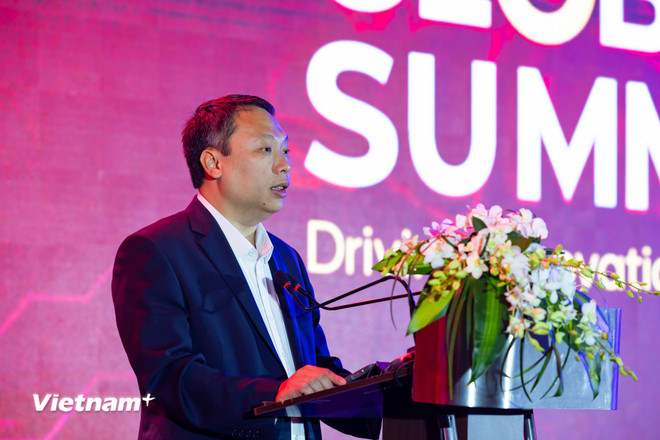
In that context, Vietnam's traditional software outsourcing industry is facing a 'historic crossroads.' The rise of AI is forcing engineers to leave their 'code-for-hire' comfort zone and become co-creators of products with customers.
A story raised by Mr. Huy Dung at the Conference made many people ponder: The CEO of a Fortune 500 corporation asked his outsourcing partner: "If AI agents can automatically do this job, then why do we need you?"
This is no longer a hypothesis, but has become an existential question for the outsourcing industry. In fact, the new generation of AI Agents is breaking three laws that were once considered immutable in the industry: Scarcity of talent; Geographic cost advantage; and the law of irreplaceability of human intelligence.
These rules being overturned means that software outsourcing businesses have to reposition their value in the service supply chain.
To better visualize the challenge, Mr. Dung analyzed the structure of a software project consisting of three layers: Concept layer (understanding business operations and problems), Logic layer (system design) and Physical layer (writing executable code).
For a long time, Vietnamese IT engineers have mainly played at the lowest level, the Physics level, where they write code according to available designs. However, with the rise of AI and no-code/low-code platforms, the Physics level is being automated at a dizzying speed. The pure coding work that used to be the "bread and butter" of thousands of programmers is gradually being shared by machines.
The value of contribution thus shifts strongly to the upper layers, which requires the role of Information Systems (IS) professionals who understand the business problem and design the overall solution.
At the same time, a new competitive storm is forming in the digital talent market. Mr. Dung cited the recent strategic cooperation agreement between Japan and India as a wake-up call: Indian high-tech workers are now willing to accept salaries 20–30% lower than Vietnamese engineers, and they are also being more highly valued for their AI expertise.
This signals that the next decade will no longer be a race for low cost, but will shift to a fierce competition for value. Vietnam has no other way but to move up the value chain: from a processor at the Physical layer to a co-creator at the Conceptual layer.
Building a Technology Task Force: Strategy in the Age of AI
According to Mr. Dung, the most important innovation at this time must come from the nature of the business model. That is the journey of shifting from Transaction to Transformation. Technology companies must boldly escape the role of a mere outsourcing contractor to become a digital transformation partner of customers.
Technically, this corresponds to leaving the Physical (IT) layer 'playground' to master the Conceptual (IS) layer 'playground' - where businesses participate from the early stages of problem formulation and solution design, instead of only participating at the end stage of programming on demand.
Mr. Dung compared two models: Transactional and Conversional. In the Transactional model, contractors only code according to the design provided by the customer, i.e. 'selling hours' at the low level and collecting money by project. That 'playing field' is gradually being narrowed by AI.
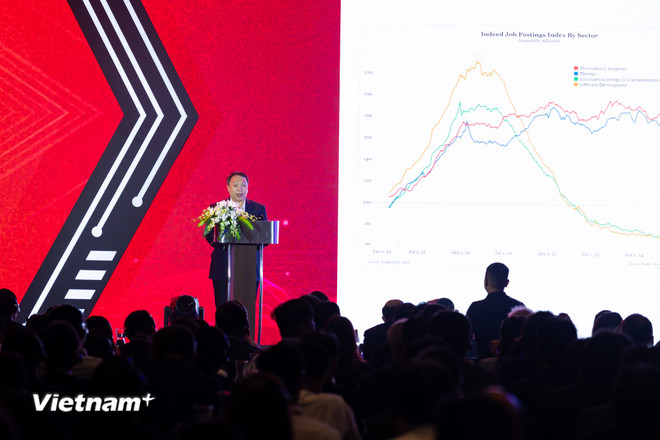
In contrast, the Transformational model requires the service provider to sit at the table with the customer from the beginning to define the problem to be solved; here, the business sells 'brainpower,' sells complete solutions, not just sells labor. This is the future of the software service industry.
A recent survey found that 81% of businesses want their outsourcing partners to act as 'strategic partners' rather than just regular 'suppliers'.
According to Mr. Dung, customers no longer buy service level agreements (SLA), but they buy the business results that the service brings. This trend requires a drastic change in thinking for Vietnamese IT service companies. The mindset of a leading provider in the AI era is no longer 'how to complete the job efficiently' but 'how to completely eliminate that job through automation.'
"The core competency of the future engineer is the ability to combine human empathy with the power of machines to find breakthrough ways of doing things, not just improving old ways," Mr. Dung emphasized.
Regarding the competitive advantage of Vietnamese enterprises, according to Mr. Dung, it lies in their compactness, eliteness and flexibility. Instead of building large, cumbersome armies, we need technologically advanced 'special task forces', which, although small in number, have high skills, strong fighting spirit and are mobile in all situations.
To have such elite 'task forces', businesses need a sustainable talent strategy. Mr. Dung emphasized that this is not simply a race to attract 'star' personnel, but more importantly, it is an in-depth investment in people. In the future, the global workforce, including Vietnam, will have to continuously upgrade their skills to adapt to AI. And above all, businesses must put the development and happiness of their employees at the center.
According to Mr. Nguyen Huy Dung, that is why training missions like the Rikkei Education program that Rikkeisoft pursues become strategically significant. Rikkeisoft's vision of "Let farmers know how to code" - to popularize programming knowledge for people outside the information technology industry - now has a profound meaning: When technology empowers experts in all fields to create their own solutions, that is the pinnacle of efficiency.
The message from this Rikkei Global Summit is also very clear: Vietnam's software outsourcing industry can only move forward by accompanying and co-creating with customers 'go together, create together' instead of doing it for hire on demand.
That spirit of innovation and efficiency was concretized at Rikkei Global Summit 2025 with the new strategy of Rikkeisoft - the event host.
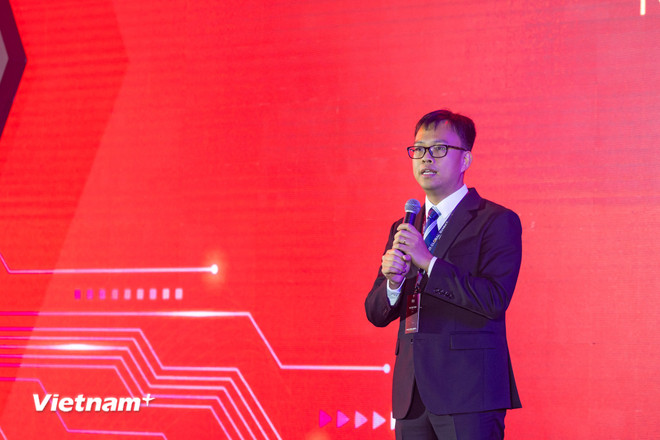
Mr. Ta Son Tung - Chairman of the Board of Directors of Rikkeisoft shared that RGS2025 is not only a milestone in the company's 13-year journey, but also opens a new growth phase with a clearer global vision.
In the new journey, the company focuses on four strategic directions: Investing heavily in AI as a core growth driver; Developing human resources through cooperation with universities and the 'three-house' model (State-school-enterprise); Expanding the global market, transforming from outsourcing to providing comprehensive consulting and technology solutions and finally preparing for the IPO milestone, with the aspiration to become Vietnam's next technology unicorn.
"We aim for 50% growth each year, with the aspiration to bring Vietnamese intelligence to the world," Mr. Tung emphasized.
Within the framework of the event, Rikkeisoft signed memorandums of understanding (MOUs) with a series of strategic partners. These agreements are the foundation for Rikkeisoft to expand its market, develop technology human resources and strengthen international cooperation, contributing to bringing Vietnamese technology closer to the world.
In parallel with the signing ceremony, the series of Conferences and In-depth Discussions at RGS2025 provided practical perspectives on AI applications in business, digital transformation of enterprises and development of high-tech human resources. International guests also had the opportunity to experience Rikkeisoft's technology ecosystem through the solution exhibition area, visit the company headquarters and interact with students at partner universities./.
Source: https://www.vietnamplus.vn/viet-nam-can-lam-gi-khi-nganh-gia-cong-phan-mem-buoc-vao-nua-sau-ky-nguyen-ai-post1069461.vnp


![[Photo] Opening of the World Cultural Festival in Hanoi](https://vphoto.vietnam.vn/thumb/1200x675/vietnam/resource/IMAGE/2025/10/10/1760113426728_ndo_br_lehoi-khaimac-jpg.webp)


![[Photo] Unique Phu Gia horse hat weaving craft](https://vphoto.vietnam.vn/thumb/1200x675/vietnam/resource/IMAGE/2025/10/10/1760084018320_ndo_br_01-jpg.webp)

![[Photo] Ho Chi Minh City is brilliant with flags and flowers on the eve of the 1st Party Congress, term 2025-2030](https://vphoto.vietnam.vn/thumb/1200x675/vietnam/resource/IMAGE/2025/10/10/1760102923219_ndo_br_thiet-ke-chua-co-ten-43-png.webp)






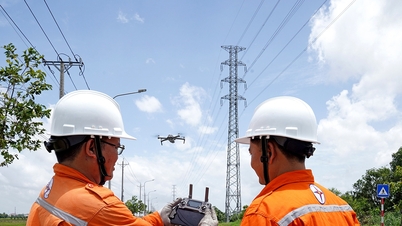

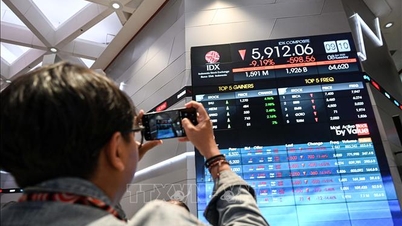





















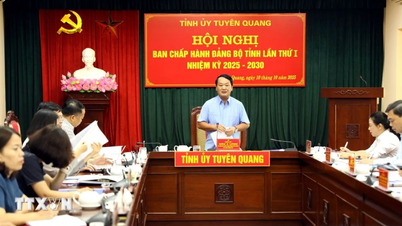












































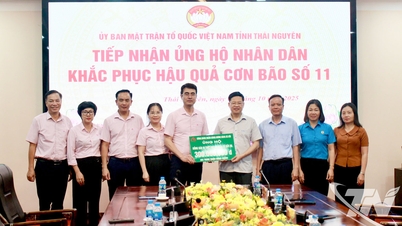






















Comment (0)